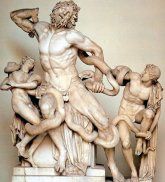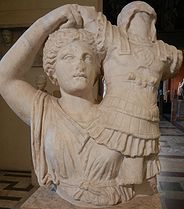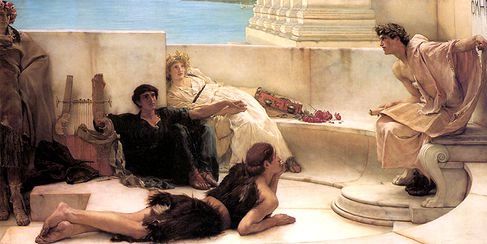Content created: 2019-09-26
Open anthropology dictionary in new window.
Open world map in new window.
Ancient Greece
A Brief Introduction for College Students (1)
D.K. Jordan
Why is this here?
Any college world-civ course in the United States will have a section on ancient Greece. In the one I taught at UCSD for many years, only about a week could be spent on this immense subject, so the coverage was necessarily extremely general, although I tried to make it provocative rather than superficial. Nearly all of the materials used have migrated to this web site, where they may be of use to other teachers or students. Brief as all of this is, it should nevertheless should get you through the Greek sections of most American world-civ courses. It is also jollier than most dudes-and-dates textbooks.
Relevant materials on this web site include following:

Laocoön and Sons Destroyed by Sea Monsters (Roman Period, Musei Vaticani)
- Slightly Geeky Guide to Pronouncing Ancient Greek Without Knowing Any Ancient Greek (Highly Recommended)
- A Beginner’s Guide to the Iliad
& the Trojan War
(This won’t substitute for reading the work itself in a world lit course, but it will turn out to be way more useful and interesting than whatever they assign you in a world civ course.)
- Ancient Greece: A Very Brief Introduction: (Beginning on this page.)
- Ancient Greece 1: Early Greek History (1600-500) (beginning on this page,
- Ancient Greece 2: Later Greek History (500-0),
- Ancient Greece 3: Philosophers, Alexander, & Hellenism,
- Ancient Greece 4: Appendix: Keywords & Greek Values,
- Ancient Greece 5: Appendix: Greek Geography.
- Annotated Texts
- Plato: Charmides (Chapters 154-160)
- Plato: The Republic (Beginning of Book I)
(Two works intended to be read together as an introduction to Socratic reasoning.)
- Xenophon: Oeconomicus (Chapters A.1; A.2.1-5)
(More Socratic reasoning: Wealth and how to achieve it.)
- Xenophon: Memorabilia (Chapters I.3.5-14)
(More Socratic reasoning: How to live on very little.)
- Plato: Phaedo (Chapters 59-64)
(Socrates’ trial and death.)
- Hippocrates: Comments on Medicine
- Aristotle on Meteorology III:2-4
- Aristotle on Poetics Chapters 4-5
“Ancient Greece,” parts 1-5, assumes that you have already read the Iliad Guide. (It’s had many thousands of hits, so presumably it is worth your time.)
Ancient Greece I:
Early Greek History (1600-500 BC)
This page begins with the shadowy Mycenaeans (my-senn-NEE-uns) and the famous "Greek Dark Age," towards the end of which Homer lived. The next file will cover the brief Classical period, with its two traumatic wars, and then the rise of Alexander and Hellenism.
Page Outline
- Six Dates to Memorize
- 1. The Mycenaeans 1600-1200
- 2. The Greek Dark Age (1200-800)
- 3. The "Archaic Age" 800-500
- Excursus: The Greek Polis
| Six Heavily Rounded Dates to Memorize |
|---|
| 1600 (±100) | Minoans, centered in Crete, thriving. |
| 1400 (±100) | Mycenaeans, centered in the Peloponnese, conquer the Minoans. |
| 1200 (±100) | Trojan War. Mycenaean world abruptly collapses. So does the Hittite empire and most Levantine mini-states; iron starting to displace bronze. Populations collapse. Dark Age begins. |
| 800 (±100) | Dawn of the "Archaic Age" or "Greek Renaissance"; Homer's Iliad; beginning of recovery from Dark Age. |
| 400 (±100) | Classical Greece thriving (sort of) |
| 0 (±100) | Classical Rome thriving (sort of) |
(For a long list of Troy-focused Greek dates for people who love dates, click here.)
Return to top.
1. The Mycenaeans 1600-1200

Early Mycenaean Gold Goblet From Troy
(Pushkin Museum, Moscow)
By 2000: Indo-European Greek speakers were already living in Greece. Earlier "Cycladic" populations (named after the Cyclades islands in the central Aegean) may or may not have been Greek speakers. (The smart money is on not.)
- 1600-1200 Mycenaean Age
- Greece controlled by great palaces (Mycenae, Pylos, Tiryns, Thebes), apparently with monarchs and apparently engaged in a redistributive economy (definition).
- Linear B shows they spoke Greek, but available texts include no literature or history; only economic records.
(Linear A found only in Crete looks similar but undeciphered)
- 1400 Mycenaeans conquer Minoans
- The developing Mycenaean society, like Minoan society earlier, exhibited extreme vulnerability as a trading system in which:
- Agricultural commodities, subject to bad growing seasons, are an central component.
- Many trade goods consist of reprocessed raw materials (tin and copper) coming from great distances.
- Transportation is critical but easily disrupted.
- The population grows until it is becomes dependent on trade for subsistence goods
- 1200 Destruction of the Mycenaean palaces (or their reduction to villages)
- It seems probable that a region-wide, multi-year drought undercut the agricultural system with a cascade of destructive effects, not just in Greece, but throughout the eastern Mediterranean. Drought could have led to famine and trade collapse, producing epidemic disease, raiding, piracy, refugees, and abandonment of major centers, all of which seem to have happened. (Some of our best ancient sources are Egyptian mortuary wall inscriptions from the reign of Ramses III and collections of clay tablets baked when palaces burned in Pylos, located on the western coast of the Peloponnese, and in Ugarit, located on the coast of Syria.)
- Other possible causes are discussed in the 4th section of the Iliad Guide (link). Some scholars attribute the decline, at least in part to the Sea Peoples and/or the Dorians. Some have proposed an earthquake storm.
Return to top.
2. The Greek Dark Age (1200-800)

Victory as a goddess cheerfully carrying off the armor of a fallen soldier as booty after a successful battle
(Greek, first century BC, a little before the Roman conquest)
- Whatever its cause, the 1200 population collapse had various effects:
- There was more available land, and hence more herding, and therefore more raiding, and therefore more community defenses
- In the absence of old palace-based control, there was more very local (hamlet-level) self-sufficiency.
- A refugee diaspora filled other regions with Greeks (esp. Cyprus and the coasts of the eastern Mediterranean), creating to some extent the beginnings of a multi-regional pan-Greek ethnicity/community, incorporating cultural enrichment from indigenous populations in those regions.
- The Mycenaean aristocracy was replaced by a system vaguely reminiscent of the "big-man" systems of Papua New Guinea (together with lots of local bullies); an honor code arose based on raiding, presentations, and feasts. (Homer, to the extent that he is reflecting this situation, seems to stress beef feasts.) (Further note.)
- Prestige was often associated with honor won by shaming or, better yet, killing the warriors from other communities.
- The Bully/Big-Man system eventually stabilized as relatively weak monarchs maneuvered to make the position hereditary.
- Occasionally some sort of assembly of citizens was necessary to persuade people to take needed communal action.
- Councils of cronies of the "monarchs," tied together by marriages and other personal relations, were accidental predecessors of later leadership councils in Classical times. (Notice the role accorded to Helen's marriage in the Iliad.)
- Land once again became valuable as populations rose. Gradually the wealthy, land-owning families (with armor and horses) absorbed lasting offices of state, producing aristocracies. (The title of these office-bearers —often essentially collectors— was archones [̕αρχονης], which gives us the English word "archons." You always wanted to know what an "archon" was, right?)
- Influential people who felt excluded from the increasingly rigid aristocracies tended to rebel, installing their own "tyrants" and producing a new aristocracy until overthrown in later rebellions. (Linguistic note.)
- The Mycenaean writing system —Linear-A— was lost when the whole Mycenaean system of governance collapsed. Illiteracy, always widespread, became universal.
Return to top.
3. The "Archaic Age" ("Greek Renaissance") 800-500

"Ancient Recitation of Homer" by Sir Lawrence Alma-Tadema, 1885
Unappealing to today's tastes, Alma-Tadema's presentations of classical subjects were hugely popular in the Victorian era.
By 850 or so:
- More complex buildings and grave goods suggest more trade and a population increase.
- A move from stock raising back to farming occurred and with it the beginnings of a landowning aristocracy that was to dominate the scene in classical times.
- About 800 a new Greek script emerged, borrowed with modifications from Phoenicians, as discussed in a separate web page on written language (link). This was the parent of modern Greek script, the kind used in labeling American college fraternities and sororities.
- City states appeared once again. This time they were not barricaded in centralized and redistributive citadels, although they were often walled to defend themselves against their annoying neighbors. The new settlement form is called a polis (πολις).
Return to top.
Excursus: The Greek Polis
A human being, said Aristotle, is a politikon zôon (πολιτικον ζῳον), which too conveniently translates as “political animal” but actually means “an animal living in a polis.” The polis (pl. poleis) is a “city-state”, often at war with its neighbouring poleis. (It is hard to see that it was different enough from Ur or Kapilavastu to make a fuss about it, but people do. The word polis has probably turned up on the final exam of every American world-civ exam ever devised. By way of general contrarianism, I never included it.)
Physically, a polis was a town, often walled, plus its surrounding countryside.
If successful, its population increased, and as it outgrew the carrying capacity of the area, it often sent forth some of its population to other regions to found copies of itself as colonies.
Each polis —including the colonies, somewhat surprisingly— was fiercely independent. At no time did all Greek poleis cooperate as a single Greek nation. (The closest was their alliance against the invading Persians in 490-479 BC, and even that did not include everybody or go very smoothly.) But despite political fragmentation, there was extensive cultural continuity among Greek speakers. The term "pan-Hellenic" is used to refer to customs or events widely shared across separate Greek political entities. (In American universities the same term refers to activities or organizations spanning several fraternities or sororities.)
Perhaps the most important thing about poleis is that virtually all of Greece seems to have been organized that way by the time when the Greek Renaissance was giving way to Classical Greece.
In 776 the first "Olympic" games were held near Elis (in the northwestern Peloponnese) in honor of Zeus; and eventually other pan-Hellenic games, especially at Olympia, Delphi, Nemea, and Isthmia, became occasions for regular, multi-day cease-fires among squabbling poleis. (The name "Olympic" was first used in 1896 when the custom was revived.)
By the 600s:
- Surprisingly large, well disciplined armies were being gradually equipped with with iron weapons. The term "hoplite" is applied to the warriors so equipped. (Linguistic note.)
- Therefore the security of the polis was no longer in the hands of the wealthy few (the sort of thing that Homer describes). Hoplite equipment, had become both cheaper and more lethal than earlier arms. (Some refer to this as the rise of the middle classes. That seems pushing it, but armies were clearly larger and weaponry more industrial-looking.)
- In view of their contributions to warfare, commoners demanded their say, apparently the dawn of the concept of a standing people’s assembly and court.
- In southern Greece, only Sparta and Argos kept their kings. Other poleis had various forms of assembly-dominated democracy. (Sparta, located in a district called Lakonia, was famed for its frugal —"spartan"— life style, taciturn —"laconic"— speech, and severe child-rearing, perhaps inspired by the concern to maintain public order at all costs, since nearly seven eighths of the population were potentially rebellious slaves.)
In 594 Athens underwent the famous "Reforms of Solon." Solon (Σόλων) lived from 639 to 559, and later Greeks loved him, but what exactly his reforms involved is not at all clear (so a lot of world-civ texts ignore him). In general, (1) Solon expanded Athenian "democracy" to include people who had grown rich but who were not "old money," and (2) he declared the forgiveness of all debts and prohibition of debt slavery. This made him popular with debtors, but not with debt holders (or slave holders), who, however, were sometimes grateful that at least he let them remain rich —also alive .
Solon was the most important member of a group of reformers modifying the earlier "Laws of Draco" —the Greek from whom we get the term "draconian." (The Laws of Draco date from 621 BC and included the death penalty for a remarkably large proportion of offenses. Draco is interesting. Go a-Googling if you are inclined to know more.)
Solon's reforms were important, even transformative, as far as we can tell. But they didn't really get the whole job done. Greek democracy was a slow process; over and over Athens ended up under the control of a tyrant selected to provide more efficient leadership through one crisis or another. Often the tyrant overstayed his welcome.
(Click here for an interesting and relevant but distracting example.)
It is Cleisthenes (Κλεισθένης), 570-508, who expanded the popular assembly and who is credited with "inventing democracy" in 508. It had its problems, as we shall see in the next section.
Return to top.
Go to
1. Early History (this page),
2. Later History,
3. Philosophers.
Go to
4. Appendix: Values,
5. Appendix: Geography.
Background Design: Linear B Script, Greece, about 1200 BC
(based on a tablet from Pylos)
This page has received

visits since 2019-09-27.




